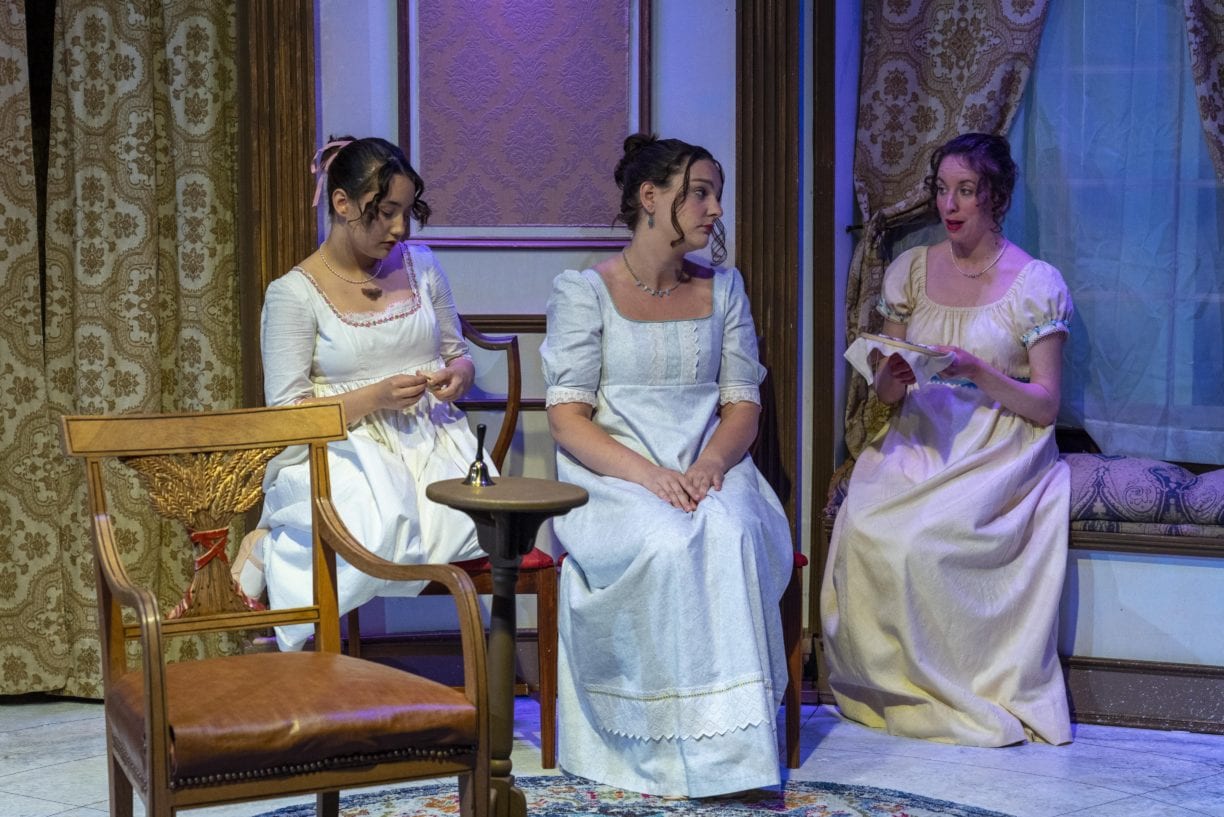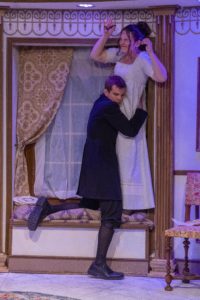All the familiar characters are there: Lizzy Bennet, her sisters and parents; suitors Darcy, Bingley, Collins, and Wickham; the de Bourghs and Charlotte. The basic plot lines and period setting are unscathed. But where Kate Hamill’s 2017 adaptation of Pride and Prejudice, now playing at Frederick’s Maryland Ensemble Theatre, departs from traditional Masterpiece Theater-style versions, and even from Jane Austen’s oft-adapted novel itself, is in the tone of proceedings.

Hamill goes all-in for the screwball comedy possibilities of the story and characters. The genteel world of Austen’s Regency-era England, and the wry comedy-of-manners style of the novel, here gives way to broad comedy, intentionally exaggerated characters, and a prominent red beach ball. This has two important advantages. First, this style may well play better to a contemporary audience than the understated, gently ironic British humor of 200 years ago. There is a lot of funny stuff here, and most of it works. “If something could be a dirty joke, it probably is,” as the director’s note quotes a stage direction. Lizzy’s rejection of Collins’ proposal is a standout physical comedy moment.
Second, and more important, the show’s style places the gamesmanship of early 19th-century English mating rituals front and center. The world of Austen’s women has always been a quietly terrifying place, a kind of bloodless horror movie. The remainder of a woman’s life is determined by the choice or chance of a marriage. By unsubtly emphasizing the point, Hamill raises the stakes in a visible way, making the comedy, and the satire of a male-dominated social structure, all the more powerful.
The principals – Lizzy (a sparkling Christine Jacobs) and Darcy (Aaron Angelo) – both intelligent, prickly, and often unaware of their deepest emotions, have the kind of relationship that conjures the feel of the wonderful Cary Grant/Katherine Hepburn pairings in Bringing Up Baby or Holiday. As the play goes on, the growth of their self-realization fuels very real passion, leading to an emotionally satisfying and convincing conclusion. These are characters an audience will care about.
It is among the supporting characters that the interpretations go wild, featuring several double castings, most of them cross-gender. Jeremy Myers is both an enthusiastic, childlike Bingley – one almost wishes he had a lollipop – and Lizzy’s hopelessly lonely, perpetually sniffling sister Mary.
Tori Weaver is thoroughly convincing as long-suffering paterfamilias Mr. Bennet, hiding his good sense behind his copy of The Times, which also serves as a shield against his unremittingly overbearing, matchmaking-mad wife (Laura Stark). Weaver also embodies the resigned pragmatism of Lizzy’s friend Charlotte. She makes noticeable and interesting characters that could otherwise get lost among their more colorful counterparts.

Matt Baughman gives a tour de force of awkwardness as both the creepy, loudly horticulture-crazed Collins and Bingley’s hapless sister Caroline. Daniel Valentin-Morales combines the looks of a romance novel hero with the morals of a snake as the execrable Wickham. Besides playing Lizzy’s naïve youngest sister, Lydia, Morgan Southwell makes a striking impression as the imperious Lady de Bourgh. Molly Parchment is sweet as Lizzy’s lovelorn sister Jane – the warmth of the sibling relationship is well developed – and, in perhaps the evening’s oddest bit, plays Lady de Bourgh’s daughter Anne, whose face is never seen and who sounds like a beleaguered cat.
Ira Domser’s attractively appointed period set divides between the Bennet house stage left and, appropriately enough on a raised platform, the upper class Darcy/de Bourgh residence on stage right. Suzanne Beal’s direction moves the actors seamlessly, rather cinematically, from one space to the other, and Tabetha White’s lighting design follows them just as smoothly, at times highlighting an actor or two in a white special.
Dance is a key metaphor for both the games the characters play and the genuine emotion between Darcy and Lizzy, and choreographer Julie Herber makes good use of period-style movement to make the play’s contemporary points. Elizabeth Tringali’s costumes are both appropriate for the period and characters, the over-the-top outfits for Mary, Caroline, and Anne being intentional exceptions.
This is a production that will appeal to both Austen lovers and those who like their romantic comedies with more intelligence and inventiveness than the typical Hollywood product.
Running Time: Two hours and 10 minutes, including one intermission.
Pride and Prejudice plays through June 16, 2019, at the Maryland Ensemble Theatre, 31 West Patrick Street, Frederick MD. For tickets, you can call (301) 694-4744 or go online.
On June 9, 2019 at 1:30 PM, the theater is sponsoring a lecture on Pride and Prejudice by Dr. Trevor Dodman, Associate Professor of English at Hood College (free, but reservations must be made through the box office).




